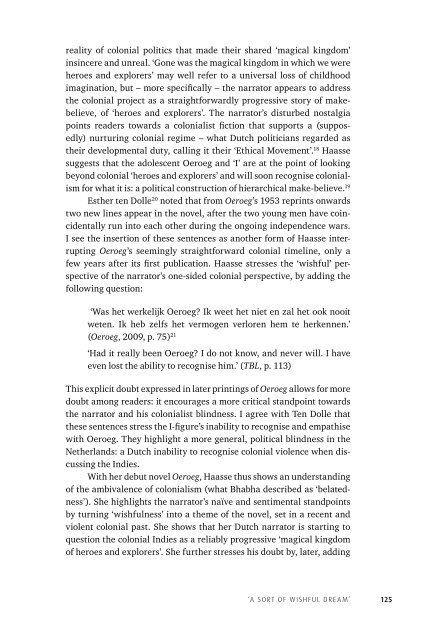Discord Consensus
7aze300jFJo
7aze300jFJo
You also want an ePaper? Increase the reach of your titles
YUMPU automatically turns print PDFs into web optimized ePapers that Google loves.
eality of colonial politics that made their shared ‘magical kingdom’<br />
insincere and unreal. ‘Gone was the magical kingdom in which we were<br />
heroes and explorers’ may well refer to a universal loss of childhood<br />
imagination, but –more specifically –the narrator appears to address<br />
the colonial project as a straightforwardly progressive story of make-<br />
believe, of ‘heroes and explorers’. The narrator’s disturbed nostalgia<br />
points readers towards a colonialist fiction that supports a (supposedly)<br />
nurturing colonial regime –what Dutch politicians regarded as<br />
their developmental duty, calling it their ‘Ethical Movement’. 18 Haasse<br />
suggests that the adolescent Oeroeg and ‘I’ are at the point of looking<br />
beyond colonial ‘heroes and explorers’ and will soon recognise colonialism<br />
for what it is: a political construction of hierarchical make-believe. 19<br />
Esther ten Dolle 20 noted that from Oeroeg’s 1953 reprints onwards<br />
two new lines appear in the novel, after the two young men have coincidentally<br />
run into each other during the ongoing independence wars.<br />
I see the insertion of these sentences as another form of Haasse interrupting<br />
Oeroeg’s seemingly straightforward colonial timeline, only a<br />
few years after its first publication. Haasse stresses the ‘wishful’ perspective<br />
of the narrator’s one-sided colonial perspective, by adding the<br />
following question:<br />
‘Was het werkelijk Oeroeg? Ik weet het niet en zal het ook nooit<br />
weten. Ik heb zelfs het vermogen verloren hem te herkennen.’<br />
(Oeroeg, 2009, p. 75) 21<br />
‘Had it really been Oeroeg? I do not know, and never will. I have<br />
even lost the ability to recognise him.’ (TBL, p. 113)<br />
This explicit doubt expressed in later printings of Oeroeg allows for more<br />
doubt among readers: it encourages a more critical standpoint towards<br />
the narrator and his colonialist blindness. I agree with Ten Dolle that<br />
these sentences stress the I-figure’s inability to recognise and empathise<br />
with Oeroeg. They highlight a more general, political blindness in the<br />
Netherlands: a Dutch inability to recognise colonial violence when discussing<br />
the Indies.<br />
With her debut novel Oeroeg, Haasse thus shows an understanding<br />
of the ambivalence of colonialism (what Bhabha described as ‘belatedness’).<br />
She highlights the narrator’s naïve and sentimental standpoints<br />
by turning ‘wishfulness’ into a theme of the novel, set in a recent and<br />
violent colonial past. She shows that her Dutch narrator is starting to<br />
question the colonial Indies as a reliably progressive ‘magical kingdom<br />
of heroes and explorers’. She further stresses his doubt by, later, adding<br />
‘A sort of wishful dream’ 125


